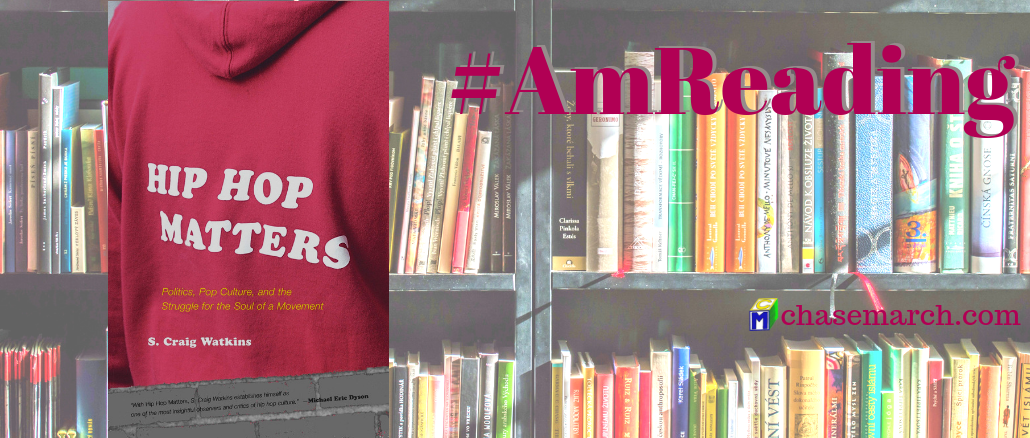Hip Hop Matters – Politics, Pop Culture, and the Struggle for the Soul of a Movement by S. Craig Watkins
Here are some of the things I learned while reading this book.
The Story Behind the Message
We all know “The Message” by Grandmaster Flash and the Furious Five. It is often heralded as the first conscious rap song. Would you believe this song starting out with a rhythm tapped on a water bottle, that it was shelved for a year, and that the hook was written by a studio musician?
Watkins tells the story is his book. Duke Bootee, a well-known jazz and pop-funk percussionist, began tapping out an intriguing rhythm on an empty water bottle. Sylvia Robinson, founder of Sugar Hill Records, asked him to come up with a hook and then suggested recording a catchier, more commercial track. The song sat on a shelf for a year before Duke came up with the iconic chorus, “It’s like a jungle sometimes it makes me wonder how I keep from going under.”
Grandmaster Flash and the Furious Five originally didn’t want to to do the track. They wanted to keep a lighter tone and thought it was preachy. It was also outside of their usual party rap style. They often traded rhymes and prided themselves on their live performances. This track was quite removed from what they were all about. But Robinson, really wanted to track to move forward. She approached Melle Mel with a verse that Bootee had written for it. Mel completed the track on his own and it was released as under the group banner. It probably should’ve been released as a solo project though.
Canadian Connection
Bryan Turner, president of Priority Records, is Canadian.
Soundscan & N.W.A.
Soundscan was created to track the actual sales that were occurring in record stores. Until its implementation, rap sales has been under-reported for a variety of reasons. Store owners who didn’t particularly like the genre, along with any preconceptions of what it meant for their business, didn’t show much in the way of rap sales at their stores. This all changed when this new measuring system was put in place in 1991.
Basically, what happens is that data is collected from every single album and single sale made. This information is collected and reported on a weekly basis. It is the source for the Billboard charts. Record stores owners could no longer control the data. As such, it became immediately apparent that rap music was selling in huge numbers. This is one of the reasons N.W.A. continued to sell so well. The numbers brought commercial legitimacy to the underground hip-hop group and helped them grow in popularity.
Cultural Tourism
The idea of cultural tourism was new to me. I never really thought about the ways we can experience different cultures through art and music. But it makes sense. William “Upski” Wimsatt is quoted in the book as saying, “Hip-hop was their fantasy island, a place to travel largely through the pleasures of consumption-rather than actual contact into a foreign world-where they could live out some of their wildest desires.” Watkins points out that Eminem battled this idea by working hard to prove that he wasn’t out to exploit the commercial value of hip-hop. He even went so far to show that his whiteness was a liability in a genre and culture of almost exclusively black artists.
Internet Platinum Plaques
Public Enemy was the first platinum selling music group or artist to release a new album via the Internet. They did it with 1999’s “There’s a Poison Goin’ On” via Atomic Pop. Another significant aspect of this was that PE maintained ownership of the master recordings. Traditionally, the record companies owned the recordings. They certainly were ahead of their time with these concepts.
The Internet Turned Commercial
Watkins writes, “In a relatively show period of time the Internet, once perceived as a tool for activism, education, and civic engagement was turned into a tool for consumption, leisure, and entertainment.” That really is a shame and something to think about it.
Internet Collaborations
Public Enemy had another first. They created the first truly interactive album in August of 2002 with the release of “Revolverlution.” They sought out contributors to create remixes. Up until this point, remixes were done by famous musicians and were kind of rare. Putting this power into the hands of fans, and legitimizing them but publicly releasing them on an album was huge.
Radio Still Has Power
“Radio’s power to determine pop hits is a sign of how much and how little has changed in the industry . . . radio is still the real backbone. . . Radio maintains an intimacy with music audiences that music videos can never achieve. The medium, despite its problems, is personal, portable, and, in its unique way, still powerful. Those and other factors make pop radio an indispensable part of young people’s everyday lives.”
I enjoyed this read and think you will too.
My List of 2018 Reads – nearly finished now. 2019 list coming soon!
